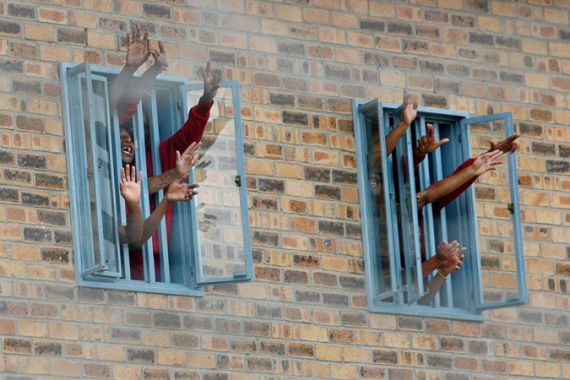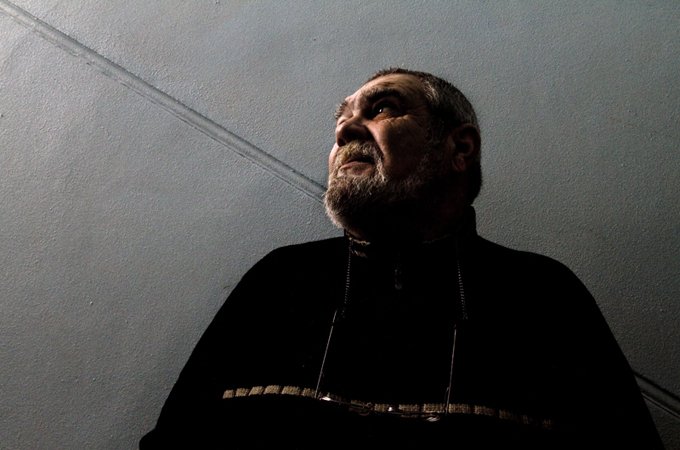Tuberculosis stalks South African prisons
Overcrowding, poor healthcare blamed for TB that killed 78 prisoners across country’s ‘breeding ground’ jails last year.

Dudley Lee, 59, walked out of Pollsmoor Prison in Cape Town, South Africa a free man in 2003. He is now a prisoner of the disease he acquired there.
Awaiting trial on charges of fraud and money-laundering, Lee was incarcerated for four years and contracted tuberculosis (TB) in the prison’s unsanitary conditions.
Although Lee was exonerated for a lack of evidence, he received no apology from the South African government. After his stint in prison, his lungs were scarred and he had aged dramatically. By the time he got out, he had lost his health, family and business.
Tuberculosis has become a major killer in South Africa’s prison system.
Seventy-eight inmates died of TB last year – making the infectious disease the leading cause of death in most of the country’s prisons, according to the government-appointed Judicial Inspectorate of Correctional Services. Pollsmoor, where Lee was held, has a TB transmission rate of 90 per cent per year, according to research by Professor Robin Wood, director of the Desmond Tutu HIV Centre.
Wood has labelled the prison a “breeding ground” for the disease, mostly because of overcrowding and a lack of ventilation.
High incarceration rate
With 160,545 inmates, South Africa has one of the highest incarceration rates on the continent.
Prisons are overcrowded by 136 per cent on average. Pollsmoor Maximum is overcrowded by 230 per cent, according to the Judicial Inspectorate.
Those convicted of stealing an apple are put in the same cells as mass murderers, and juvenile facilities often house prisoners in their 30s.
 |
| Dudley Lee contracted TB while awaiting trial for four years [Sydelle Willow Smith/Al Jazeera] |
One-third of inmates in South Africa are still awaiting trial, according to the Judicial Inspectorate.
Researchers from Wits Justice Project, a non-governmental organisation, say prisoners have spent up to five years in jail awaiting trial. Documents seen by this reporter from the Department of Correctional Services show some have waited for as long as 10 years.
Those waiting for justice have no access to psychologists, even if they have been raped in prison or infected with a disease.
The scourge of TB in South African prisons came to national attention only recently, when Lee took the minister of Correctional Services to the Constitutional Court. He is demanding damages for the harm he suffered from the disease, alleging prison authorities are directly responsible.
During the trial, the state acknowledged when it comes to prisons, the law gets broken on a regular basis.
The Correctional Services Act 111 of 1998 and Sections 27 and 12 (e) of the Constitution state that prisoners such as Lee have the right to access medical services, to not be treated in a cruel, inhuman or degrading way, and to not be detained without trial.
No screening
New prisoners are supposed to be screened for disease when entering Pollsmoor – and quarantined if found to be ill. But no such screening or segregation process actually exists.
Lee – now in his late 60s – is unemployed and living in an old-age home. He says while in prison, after months of coughing and asking for medical attention, he was only diagnosed with TB when he was taken to hospital for a hernia. Once in the prison facility, he adds, there were not enough nurses to monitor his medicine intake.
During his incarceration, Lee was held in cells designed to hold 20 people, but were in fact holding 80.
|
“Crowding, long lock-up times up to 23 hours per day and inadequate ventilation result in prisoners re-breathing contaminated air for prolonged periods of time.“ – Robin Wood, Desmond Tutu HIV Centre |
Lee was taken to court 70 times during his stay. While there, he was kept in a holding cell where people from different prisons – many of whom were visibly ill – were kept together in heavily overcrowded conditions.
“You are always surrounded by people coughing and spluttering,” he says. “If I needed to see the doctor, I would have to pay the warder to open my cell and take me there.”
According to Professor Wood, Pollsmoor has several characteristics making it an ideal space for TB to spread.
“Conditions prevailing in Pollsmoor Prison are extremely conducive to the ongoing transmission of TB, including drug-resistant TB … Crowding, long lock-up times up to 23 hours per day, and inadequate ventilation result in prisoners re-breathing contaminated air for prolonged periods of time.”
Added to this is a delay of up to four months in accessing medical care, he says. As a result, the state does not know how many prisoners actually suffer from TB during their incarceration.
‘State impunity’
Paul Theron was the doctor in charge at Pollsmoor Medium A from 1997 to 2007, during the time that Lee was in prison. He was suspended when he blew the whistle on health and human rights abuses in Pollsmoor.
Theron says Pollsmoor is largely controlled by prison gangs, which the authorities are unable to control. “By definition,” says Theron, “safe custody is not possible in an environment which is largely controlled by destructive elements dedicated to their own preservation. The ongoing toleration of destructive and criminal elements within the prison disallow any progress in terms of health management.”
The Department of Correctional Services did not respond to repeated requests for comment.
Lee won his case at the High Court in 2010, but it was overturned on appeal, as Lee could not prove that he would not have contracted TB even if the prison authorities had fulfilled their duties.
Lee’s lawyer, Adila Hassim, argued at the Constitutional Court that this requirement for an “impossible calculation” would “immunise the state” from being held accountable.
The state made the case that a ruling for it to pay damages to Lee would open up the possibility for “unlimited liability” to complaining offenders.
Nooshin Erfani-Ghadimi, of Wits Justice Project, says TB in prisons has the potential to affect society as a whole.
“Prison walls are porous, and what happens inside will come out,” Erfani-Ghadimi says. “Right now the state is getting away with impunity, and if we don’t make sure conditions that inmates living in are in line with the Constitution – we are facing a disaster.”